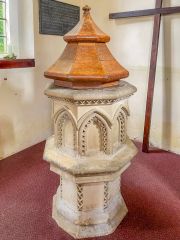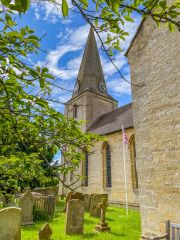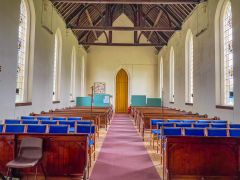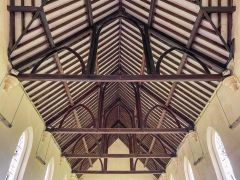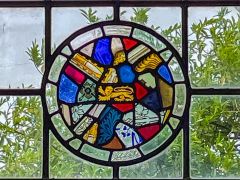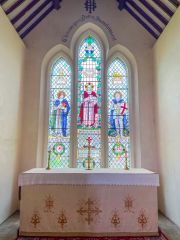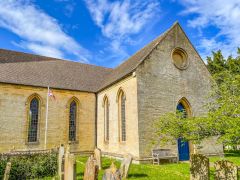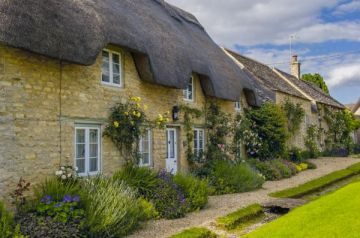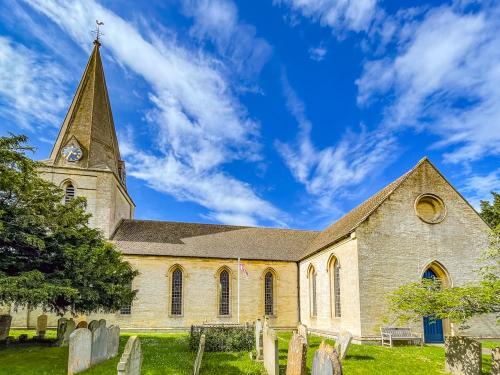
St James Church stands in the centre of Aston, on the road to Standlake. It is, at first glance, a very plain Victorian building, on a cruciform plan, with a four-bay nave and a short, single-bay chancel.
History
The church was begun in 1838, when Aston was a chapelry of Bampton. The church was paid for by private subscription and with the aid of a gift from the vicar of Bampton.
The land on which the church stands was given by Henry Hippisley, a local landowner, and the design was executed by Thomas Greenshields of Oxford. The style is nominally Gothic, though a very plain and unembellished Gothic at that. The original design called for a stumpy west tower, but to this a spire was added in 1860.
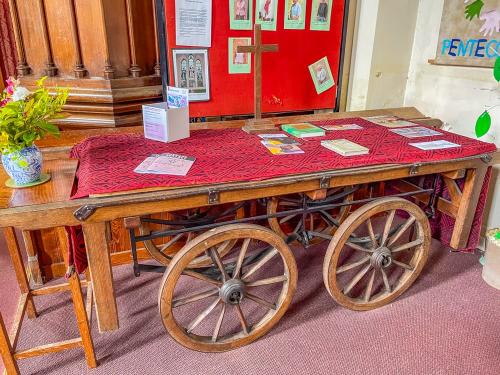
That spire was provided by William Monk, who also gave a second bell. Six new bells were added in 1883 at a cost of £410, a sizeable amount at the time.
The interior furnishings are wonderful examples of 19th-century woodworking, with beautiful Victorian benches, choir stalls, lectern, and a pulpit in Geometric Gothic style.
![The east window [Wilkinson memorial]](/images/attractions/editor4/Aston-3497.jpg)
Memorial Windows
The richly-coloured stained-glass window above the altar is relatively recent, added in 1948 in memory of Major Thornton Wilkinson of the Green Howards (Yorkshire Regiment). Another military memorial is the stained-glass window in the choir, given in memory of Captain JLM Morton of the 23rd Battalion, Manchester Regiment, who died at Passchendaele in 1917.
All other windows were designed by MC Farrah-Bell, with input from Sir John Betjeman.
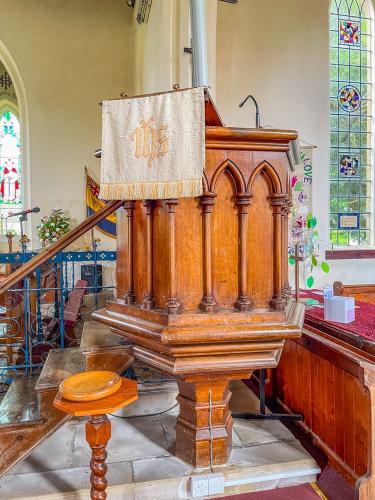
The church is unusually sparse in terms of memorials. The only two wall plaques that we saw were to 20h-century burials, the oldest being to Ellen Reed, who died in 1905 at just 22 years old.
A dedication board commemorates the church's erection and reads as follows:
'This chapel was erected in the year 1839; it contains 500 sittings, and in consequence of a grant from the Incorporated society for promoting the enlargement, building, and repairing of Churches and Chapels, 350 of that number are hereby declared to be free and unappropriated for ever.'
The wording offers a glimpse into the 19th-century, when worshippers were able to pay for reserved pews if they could afford them. The closer to the front of the church, and to the altar (and, by extension, to God), the more expensive the pews became.
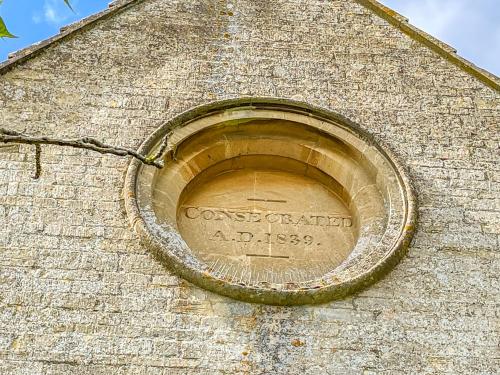
Visiting
The church is on Cote Road, next to the primary school. The church was open when we visited and, as far as we are aware, is open daily to visitors. There is parking along Cote Road, in front of the church.
If you are visiting Aston, don't miss the chance to visit the colourful Aston Pottery Gardens, a short walk away on the road to Bampton.
About Aston, St James Church
Address: Cote Road,
Aston,
Cotswolds,
Oxfordshire,
England, OX18 2DU
Attraction Type: Historic Church
Location: On Cote Road, in the centre of the village. Parking along the road.
Website: Aston, St James Church
Location
map
OS: SP342030
Photo Credit: David Ross and Britain Express
HERITAGE
 We've 'tagged' this attraction information to help you find related historic attractions and learn more about major time periods mentioned.
We've 'tagged' this attraction information to help you find related historic attractions and learn more about major time periods mentioned.
Historic Time Periods:
Find other attractions tagged with:
19th century (Time Period) - Victorian (Time Period) - Victorian Gothic (Architecture) -
NEARBY HISTORIC ATTRACTIONS
Heritage Rated from 1- 5 (low to exceptional) on historic interest
Aston Pottery Garden - 0.3 miles (Garden) ![]()
Bampton, St Mary's Church - 1.8 miles (Historic Church) ![]()
Buckland, St Mary - 2.3 miles (Historic Church) ![]()
Longworth, St Mary's Church - 3.4 miles (Historic Church) ![]()
Black Bourton, St Mary's Church - 3.6 miles (Historic Church) ![]()
Clanfield, St Stephen's Church - 3.7 miles (Historic Church) ![]()
Witney, St Mary's Church - 3.9 miles (Historic Church) ![]()
Witney Bishop's Palace - 3.9 miles (Historic Building) ![]()
